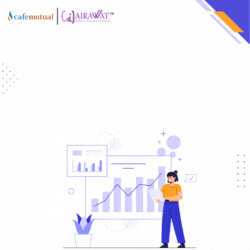With the entry of other online players such as Paytm and Flipkart (likely), how do you plan to sustain the number one position in the direct plan distribution business?
The biggest challenge in India is the very shallow market participation - approximately 20 million Indians investing through mutual funds and 6 million directly into stocks. So growing this is the main problem to solve. I am not really worried about the number one position if new players can expand the market that is more exciting. That said, we do believe that as a value proposition for an investor in mutual funds, we are better as our clients can buy direct mutual funds along with everything else - from stocks to ETF's to bonds. So hopefully this will help us stay ahead of the competition.
How are you going about acquiring clients? What is the kind of volume you have targeted?
Currently, all new clients are acquired organically and I believe we can continue to do this as long as we can keep offering a superior product experience. We currently have 1 million clients for our broking business, and only 1 lakh of those invest through Coin, the mutual fund distribution arm of Zerodha. The initial target is to convert at least half of our clients who most probably also invest in regular mutual funds.
The biggest challenge to onboard a mutual fund investors is KYC. How do you plan to deal with this challenge?
Today, anyone wanting to invest in direct mutual fund on our platform has to first open a trading and demat account. And account opening piece is something we have been improving on for the last 8 years through India Stack, leveraging tech and our sales team of over 1000 people.
Given that you are likely to attract relatively younger clients with smaller ticket size, how can it be viable for you?
Smaller/bigger ticket size doesn't really matter to us, because they are doing these investments through their existing demat account. Since we settle these along with stocks, which is an extension of our primary business, the overheads are extremely low.
A Karvy research study shows investors who invest on their own show irrational behaviour in the volatile market. How do you deal with such a situation?
Yes, if investors are left to their own. Not everyone makes smart choices. It is a challenge for pure execution platform like ours. But on the other hand, the issue of mixing advisory with distribution is that maybe what is sold is what earns the most for the distributors, leading to mis-selling and churning of the portfolio. This is a bigger problem.
I think the ideal end state for this is a pure execution platform like ours where a client invests, an advisor who charges a small fixed fee and more performance fees, with no relation between the execution platform and the advisor.
Unlike most product categories, there has been no significant shift in the consumer preference towards online investing. What do you think will be the turning point for the industry where there will be major shift towards online advisory?
This is the bigger problem like I said earlier, not just online investing - but as investing overall. I was recently talking to the exchange officials who said how the number of active direct equity investors in India have remained the same for last two decades. We had the same number from the late 90's till now. I think the main reason for this (other than the 2008 financial crisis) has been the massive bull run in Indian real estate during the same time period.
The last two years, after a long time, stock markets outperformed real estate and we have seen how the inflows through mutual fund have gone up. If the stock market can outperform other asset classes, new investors will come in for sure. And the speed at which mobile and internet are penetrating in India, if new investors come in, they are bound to be mostly online. So yeah, the real question is how stock markets will perform.
How are you going about insurance distribution? What are the other financial products you would consider going forward?
Even in Insurance, similar to direct mutual funds, I think there is an opportunity for us as a business to offer significant cost savings to the end customer. A simple combination of direct mutual funds + a term plan will be better than almost every ULIP out there, where distributors are paid commissions of up to 25% of the invested amount. We are still some time away though from starting the insurance business. We are about to go live on Loan against security business through our NBFC arm.
In a recently held industry event, you mentioned that you are looking at ways to make money out of direct plan distribution. What are the challenges in distributing direct plans?
What I was actually referring to was that making money selling only direct mutual funds is extremely tough. Clients don't mind paying commissions of up to 2% from their investments to the distributor selling regular plans, because they don't really know or see it going from them directly. But when selling direct mutual funds, the execution/advisory fees has to be collected separately. This is a big challenge, especially because most people (90% of retail) don't know the difference between direct and regular plans. For an execution platform like ours, the question is, why do you charge a monthly fee when others don't? - referring to regular mutual fund platforms. For an advisor, I am guessing the question would be, why charge fees based on AUM if your effort is the same? Also, advisors are bound to be hounded when markets don't do well.
What kind of support do you expect from the manufacturers?
I guess manufacturers are doing their bit, some of it may be forced by SEBI. So as long as they can build products which keep the client interest first before their own/or their distributors, businesses like us can do our job to attempt and get a lot more people to invest in capital markets and help in nation building.







